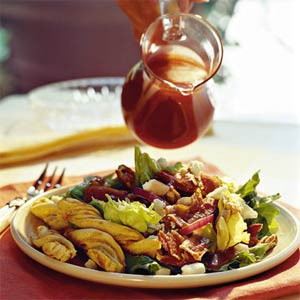There’s a lot of talk about hamburgers in the run-up to Father’s Day and most of it is crap.
Literally.
Someone in Japan made a hamburger out of human poop, the use-a-piece-of-metal-and-sear-your-tongue method of checking whether a burger is done is making the rounds, and someone .jpg) else says 120F beef is safe.
else says 120F beef is safe.
The poop burger is the safest choice.
Because if you’re going to eat poop, at least cook it (and try not to cross-contaminate the kitchen).
My Health News Daily reports today researchers in Japan have synthesized meat from proteins found in human waste.
"In the food safety world we say, ‘don’t eat poop,’" said Douglas Powell, a professor of food safety at Kansas State University. "But if you’re going to, make sure it’s cooked."
The Japanese researchers isolated proteins from bacteria in sewage. The poop-meat concoction is prepared by extracting the basic elements of food — protein, carbohydrates and fats — and recombining them.
The meat is made from 63 percent proteins, 25 percent carbohydrates, 3 percent lipids and 9 percent minerals, according to Digital Trends. Soy protein is added to the mix to increase the flavor, and food coloring is used to make the product appear red.
The researchers came up with the idea after Tokyo Sewage asked them to figure out a use for the abundance of sewage in mud, Digital Trends says.
Powell is not familiar with the researchers’ method, but said he guesses that they are first heat-treating the sewage before they reap its resources.
"Theoretically, there’s nothing wrong with this," Powell said. "It could be quite safe to eat, but I’m sure there’s a yuck factor there," he said.
However, Powell said there is the potential for cross contamination in the laboratory where the poop meat is made. That’s why it’s a good thing the meat will eventually be cooked.
But what if the final product was not going to be cooked?
"I wouldn’t touch it, " Powell said.
Pass it on: Meat made from poop is safe, but you should cook it before you eat it.
.jpg) contracting salmonella.
contracting salmonella.
 unwelcome serving of its own: a cease and desist order from the San Francisco Department of Public Health.
unwelcome serving of its own: a cease and desist order from the San Francisco Department of Public Health. .jpg) green poop this morning.
green poop this morning. The bacteria was not spread through food distributed by Jason’s Deli Distributors or Deli Management, Inc.
The bacteria was not spread through food distributed by Jason’s Deli Distributors or Deli Management, Inc..jpg) some of the most stringent safety procedures in the food industry, and have sophisticated systems in place to minimize the likelihood of contamination.”
some of the most stringent safety procedures in the food industry, and have sophisticated systems in place to minimize the likelihood of contamination.”.jpg) else says
else says  salmonella in one of the ingredients.
salmonella in one of the ingredients.  higher value on public health.
higher value on public health. family following the funeral of her grandfather, who was a life-long drinker of the product in question.
family following the funeral of her grandfather, who was a life-long drinker of the product in question.